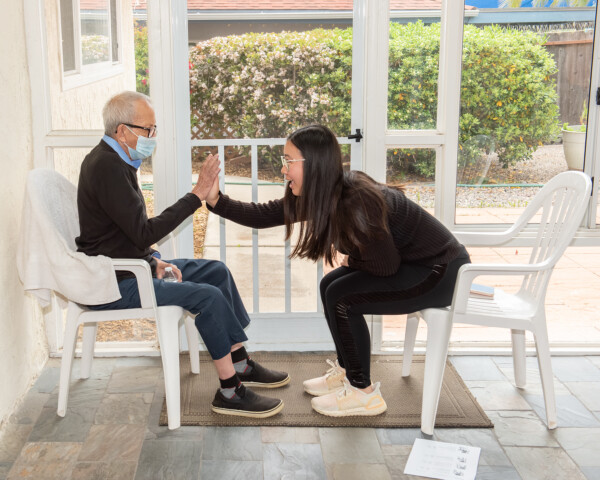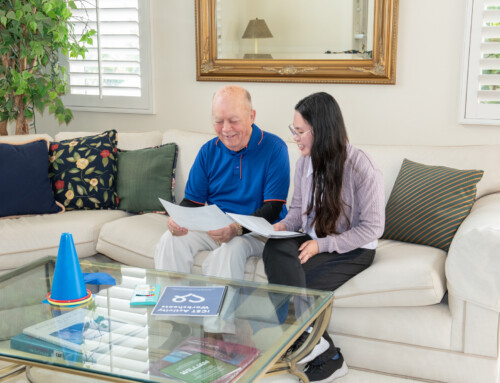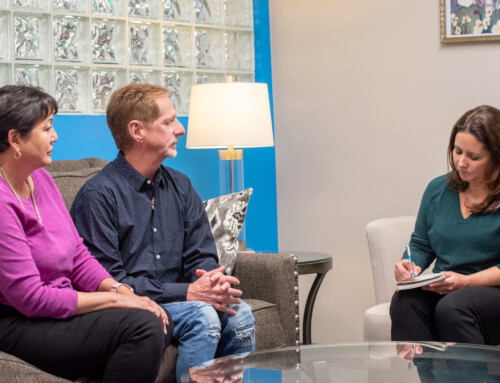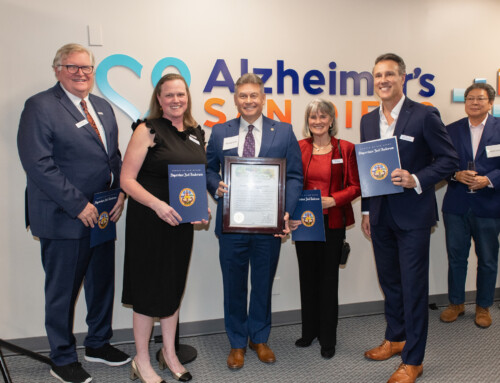
Dementia Care Coach Corner
Navigating the complexities of caring for someone with Alzheimer’s disease and related dementias (ADRD) can oftentimes feel overwhelming. A common topic of concern faced by many care partners is deciding when it is unsafe to leave someone living with dementia alone. We’ll dive into the warning signs that can indicate when it is unsafe to leave someone alone, as well as safety precautions you can take to set your loved one up for success.
Warning Signs
Although deciding when it is unsafe to leave someone living with dementia alone oftentimes depends on your unique situation, there are signs indicating that it is no longer safe.
Warning signs include:
- Wandering: Disorientation or confusion often leads to attempts to leave the home. In many instances, a person leaves the home without any identifying information, phone, proper attire and might not approach others for help if lost.
- Medication confusion: Managing medications can become confusing since a person might lose track of which medication they’ve already taken or when they are supposed to take a medication.
- Forgetting meals: A person may forget to drink water and eat meals, which can lead to dehydration and malnutrition.
- Kitchen safety: Forgetting to turn off appliances (oven, faucet, stove, etc.) after using them can lead to physical harm or fire risks.
- Fall risk: Lack of coordination, changes in vision and depth perception often lead to falls, especially if there are steps, rugs, or various items in walkways.
- Feelings of anxiety: When left alone, a person living with dementia may feel increased anxiety, agitation, or loneliness. Verbal communication or nonverbal cues like fidgeting, walking back and forth, increased shadowing, and being asked a lot of questions for the day are behaviors that can indicate uncertainty and anxiety.
- Emergency preparedness: Responding to an emergency can become confusing if a person is unable to recognize the emergency or know who to call. If they are unable to respond with the right steps when you ask them how to react to an emergency (such as calling 911), they should not be left alone.
If the person living with dementia is exhibiting any of the above behaviors, it is a sign that it is probably not best for them to be left alone.
Safety Precautions
There are several safety precautions you can take to help maintain your ability to leave your loved one living with dementia alone.
These safety precautions include:
- Fall prevention: Rug stickers, bright lighting, grab bars, and clear pathways around the home are great tools for fall prevention. This guide has great suggestions on tips to prevent falls in your home. You can also use our Home Safety Checklist.
- Ready meals: Leave meals that can be warmed up in the microwave or eaten cold so they don’t have to use the stove or turn on other appliances. Notes and other reminder cues can also be helpful in directing them to eat and drink while you are gone.
- Emergency phone numbers: Put names with phone numbers in a visible location. Add instructions on who to call during an emergency.
- Checking in regularly: Check in with them regularly while you are out by calling or texting. Having someone close by (like a neighbor) to check in on them can also be helpful.
- Wandering preparedness: Alzheimer’s San Diego has partnered with the San Diego Sheriff’s department so that you can register people living with dementia in the Take Me Home program in case they wander and are unable to identify how to get back home. You can also get a medical ID bracelet or necklace with the person’s information on it in the event that they get lost.
What Do I Do If I Can’t Leave Them Alone?
Due to the progressive nature of the disease, there will come a point when you can no longer leave the person living with dementia alone. Alzheimer’s San Diego’s team of compassionate Dementia Care Coaches are available to create a tailored care plan for your unique needs.
For personalized dementia support, call us at 858.492.4400 to speak with one of our Dementia Care Coaches who are here to help San Diego County residents and/or those caring for someone living in San Diego County (Spanish speakers available). Also check out our free education classes, social activities, caregiver support groups, & more.
Our “Dementia Care Coach Corner” series is where our team weighs in on unique topics and provide insight that can help people impacted by dementia.
By Heidi Emmenegger
RECOMMENDED: Ways to Create a Dementia Friendly Home
Posted on September 22nd, 2025






